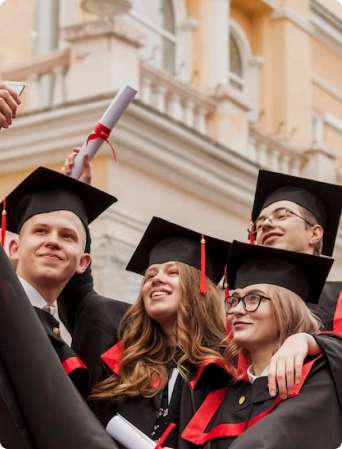Education in Slovakia » Education
Education system
in Slovakia


Education in Slovakia » Education
Secondary education
in Slovakia

Preschool education

Preschool education in Slovakia is represented by the organization of nurseries and kindergartens. Visiting the nursery is voluntary and is intended for children under 3 years of age.
For children over 3 years of age, there are kindergartens that are open all week except Saturday and Sunday.
The preschool education system in Slovakia is famous for its quality of teaching and education. The developmental program in Slovak kindergartens includes: walks, excursions, visits to theaters, educational activities and even foreign language teaching.
The cost of maintaining a child in a Slovak kindergarten may vary depending on the area where the educational institution is located and the category of the kindergarten:
state
private
departmental
Primary School
General education institutions in Slovakia are represented by both free public schools and private paid ones. There are also schools with different profiles, for example:
in-depth study of foreign languages;
artistic;
mathematical;
sports, etc.
After graduating from primary school of the first level, students who have successfully completed their studies and achieved certain results have the opportunity to continue their studies in a gymnasium or primary school of the second level, and upon completion of studies in primary schools of both levels, the student can continue their education in a secondary school or gymnasium.
The educational process is designed in such a way that throughout the entire path from primary school to secondary school, the load on the student gradually increases, as a result of which, by the time he enters the university, the applicant has the necessary specialized knowledge.
The final stage of secondary education is passing exams and obtaining a certificate necessary for admission to university.
Secondary education institutions divide the educational process as follows:

from 6 to 10 years

from 10 to 15 years
Secondary primary school or gymnasium

General education institutions in Slovakia are represented by both free public schools and private paid ones. There are also schools with different profiles, for example:
in-depth study of foreign languages;
artistic;
mathematical;
sports, etc.
After graduating from primary school of the first level, students who have successfully completed their studies and achieved certain results have the opportunity to continue their studies in a gymnasium or primary school of the second level, and upon completion of studies in primary schools of both levels, the student can continue their education in a secondary school or gymnasium.
The educational process is designed in such a way that throughout the entire path from primary school to secondary school, the load on the student gradually increases, as a result of which, by the time he enters the university, the applicant has the necessary specialized knowledge.
Secondary education institutions divide the educational process as follows:

from 6 to 10 years

from 10 to 15 years
Secondary primary school or gymnasium

The final stage of secondary education is passing exams and obtaining a certificate necessary for admission to university.
General education institutions in Slovakia are represented by both free public schools and private paid ones. There are also schools with different profiles, for example:
in-depth study of foreign languages;
artistic;
mathematical;
sports, etc.
After graduating from primary school of the first level, students who have successfully completed their studies and achieved certain results have the opportunity to continue their studies in a gymnasium or primary school of the second level, and upon completion of studies in primary schools of both levels, the student can continue their education in a secondary school or gymnasium.

The educational process is designed in such a way that throughout the entire path from primary school to secondary school, the load on the student gradually increases, as a result of which, by the time he enters the university, the applicant has the necessary specialized knowledge.
Secondary education institutions divide the educational process as follows:

from 6 to 10 years

from 10 to 15 years
Secondary primary school or gymnasium
The final stage of secondary education is passing exams and obtaining a certificate necessary for admission to university.

Gymnasiums
Admission to a gymnasium is possible on the basis of passing entrance exams or having a sufficiently high average score on the primary school certificate.
The most popular in Slovakia are gymnasiums, in which the curriculum is formed with an emphasis on specialized subjects necessary for subsequent higher education. There are a lot of people who want to study in such gymnasiums, so only the most capable students can pass the entrance tests.

Education at the gymnasium lasts for 4 years, during which students are purposefully prepared to pass final exams (in Slovak “maturita”) and enter the university.

Admission to a university without a certificate of completion of complete secondary education is impossible.
For foreign applicantswho do not have a Slovak document confirming completion of secondary education, you need to nostrify your certificate, i.e. go through the process of recognizing the certificate as equivalent to the Slovak one.
Gymnasiums
Admission to a gymnasium is possible on the basis of passing entrance exams or having a sufficiently high average score on the primary school certificate.

The most popular in Slovakia are gymnasiums, in which the curriculum is formed with an emphasis on specialized subjects necessary for subsequent higher education. There are a lot of people who want to study in such gymnasiums, so only the most capable students can pass the entrance tests.

Education at the gymnasium lasts for 4 years, during which students are purposefully prepared to pass final exams (in Slovak “maturita”) and enter the university.

Admission to a university without a certificate of completion of complete secondary education is impossible.
For foreign applicantswho do not have a Slovak document confirming completion of secondary education, you need to nostrify your certificate, i.e. go through the process of recognizing the certificate as equivalent to the Slovak one.
Gymnasiums
Admission to a gymnasium is possible on the basis of passing entrance exams or having a sufficiently high average score on the primary school certificate.

The most popular in Slovakia are gymnasiums, in which the curriculum is formed with an emphasis on specialized subjects necessary for subsequent higher education. There are a lot of people who want to study in such gymnasiums, so only the most capable students can pass the entrance tests.

Education at the gymnasium lasts for 4 years, during which students are purposefully prepared to pass final exams (in Slovak “maturita”) and enter the university.

Admission to a university without a certificate of completion of complete secondary education is impossible.
For foreign applicantswho do not have a Slovak document confirming completion of secondary education, you need to nostrify your certificate, i.e. go through the process of recognizing the certificate as equivalent to the Slovak one.
Secondary vocational schools
Schools offer specialized education, which is sufficient for admission to university.

Education in secondary vocational schools also lasts 4 years.
Graduates, after passing the final exams, receive a certificate of completion of secondary vocational education.
Secondary specialized schools

The curriculum of secondary specialized schools is designed for 2-3 years, during which students are given theoretical and practical knowledge in the chosen specialty.
At the end of their studies, students take exams and receive a certificate of “secondary vocational education”; however, admission to a university with such a document is impossible.
To continue studying at a university, an applicant must complete a 2 or 4 year program at a secondary vocational school or gymnasium and pass the final exam.
Bachelor's degree

Slovak universities offer a 3-year bachelor's program, upon completion of which the student takes a state exam, usually in several specialized subjects, and also defends his bachelor's thesis.
Students, upon completion of this stage, receive a diploma with the title (degree) of a bachelor.
This diploma allows you to start a professional activity, however, in order to achieve career growth, you need to obtain a higher title - master or for technical specialties - engineer.


Master's degree

Foreign students are also allowed to take the exams for admission to the master's program, but not everyone will be able to achieve the required passing score. The biggest obstacle in this process is the lack of proper language training; an equally important factor is the lack of specialized training within the chosen specialty at the undergraduate level.
That is why, for most of our clients, we recommend starting their studies at a Slovak university from the first stage, namely a bachelor’s degree.
Students who manage to complete their master's degree are awarded the title of master or engineer and are also issued a diploma.
After receiving a bachelor's degree, a student who decides to continue his studies at the university can apply for a master's program.
Doctoral studies

The last stage of higher education in Slovakia is doctoral studies.
Training at this stage takes 2-3 years and ends with a state exam, followed by defense of a dissertation. Students who successfully complete their dissertation defense are awarded the degree of Doctor, which is the highest academic title in Slovakia.
This title and its equivalents are a prerequisite for employment in any research position in most academic work positions not only in Slovakia, but throughout the world.



